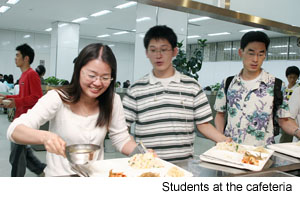 On February 10, SNU Co-Op (SNUCO) announced that the price of cafeteria meal tickets will go up for non-SNU community members.
On February 10, SNU Co-Op (SNUCO) announced that the price of cafeteria meal tickets will go up for non-SNU community members.
In the announcement SNUCO explained that the cafeterias could be managed with a stable cost since 2006 due to financial support from SNUCO. However, since the unremitting inflation has accumulated deficit to an unmanageable level, they have decided to implement a price increase for only those who are not members of the SNU community, taking effect as of February 20.
Thus, for someone who is not a member of the SNU community, the"A" menu will be raised from 1700KRW to 2500KRW, the"B" menu from 2500KRW to 3500KRW, and the"C" menu from 3000KRW to 4000KRW.
However, for people affiliated with SNU, prices will remain the same if their SNU ID cards are presented upon purchase. Using the recently implemented K-cash system is another method for SNU students, staff, and faculty to purchase lunch at the current price, which also entails the additional advantage of eliminating the trouble of buying tickets.
SNUCO is a non-profit organization dedicated to the welfare of the students, staff, and faculty at SNU. Basing its governing policy on the global union of consumer cooperatives, the Association of Consumer Cooperatives, it manages the cafeterias, convenience stores, souvenir shop, stationery store, and other various facilities such as the flower shop and the shoe repair shop on campus. All the cafeterias on campus are either directly managed by, or in cooperative management with, SNUCO, meaning that all cafeterias on campus will be affected by the effective price change.
Students are welcoming this initiative. SNU cafeterias have always been packed with elementary, middle, and high school students that come by the hundreds, taxi drivers, and hikers visiting Gwanak Mountain who come to eat a good meal for a low price. The original price of an SNU cafeteria meal is on average 2000-4000 KRW cheaper than off campus.
KIM Hana (College of Agricultural Sciences, junior) said,"There's such a fuss at lunch because the line is so long. Having so many visitors only makes it worse. It takes a lot of time to have lunch.”
However voices of opposition are strong.
Three days after the price increase was announced, a poster opposing this policy appeared on the entrance of the 5th and 6th reading rooms at the Central Library.
These reading rooms are opened especially for those who wish to study on campus but are not part of the SNU community. Most people who now have to pay additional money to eat at SNU on a regular basis are protesting against the discrimination.
Part of the poster reads,"If an increase in food prices is the real reason behind the rise in ticket prices, why not raise the prices for everyone in uniform? There is no doubt this policy has sprung from a sense of entitlement on the part of SNU."
On the other hand, SNU students argue that price discrimination is just, since they are the ones who pay the enrollment fee. In addition, SNUCO rejects the criticism that SNU cannot discriminate against non-SNU community members in the first place as SNU is a public university with abundant funding from the government by claiming no financial support is given from the school administration. And since it exists for the well-being of SNU community members, the price discrimination was unavoidable.
Among SNU students, there also are concerns about using the S-card as proof of identification. In the current system students on leave cannot renew their ID cards, which means that they are potentially treated as outsiders even though they are still part of the SNU community. There are also concerns about SNU alumni who are normally without possession of ID cards. The majority of the students believe a separate discount policy for SNU alumni should be implemented since this would strengthen the connection students might have with their alma mater.
It is only natural for those who are not part of the SNU community to oppose such a change of policy. Nevertheless, though accused by the media as"pitiless", the majority of SNU students believe their welfare should be prioritized since the university is their base of education.
Some people on both sides of the contention believe the finger should not be pointed at SNUCO but rather toward the government for failing to curb staggering rates of inflation in recent years. Perhaps the best way to conclude the current debate is to enlarge the dining facilities and by keeping the prices stable and low for everyone through garnering financial support. This way SNU will be able to become a much more convenient place for its inhabitants while at the same time continuing to reach out to the broader society.
Written by LEE BoYoung, SNU English Editor, bylee0708@gmail.com
Reviewed by Eli Park Sorensen, SNU Professor of Liberal Studies, eps7257@snu.ac.kr
Proofread by Brett Johnson, SNU English Editor, morningcalm2@gmail.com

